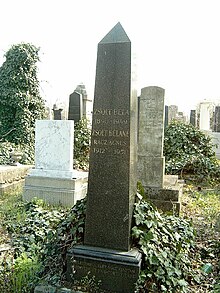Béla Zsolt
Béla Zsolt [ ˈbeːlɒ ˈʒolt ] (born January 8, 1895 in Komárom , Austria-Hungary ; died February 6, 1949 in Budapest ) was a Hungarian journalist , publicist and novelist .
Life
Even at a young age before the First World War , Zsolt was considered an outstanding representative of Hungarian décadence . In the turmoil of the revolutionary years of 1918 and 1919 he campaigned vehemently for a bourgeois- liberal order and campaigned against the Soviet republic and the emerging Christian-national corporate state of Horthys .
Zsolt moved from Oradea to Budapest in 1920 , where he quickly gained a foothold in literary life. His articles and novels gained widespread recognition. During the Second World War , Béla Zsolt - like thousands of other Hungarian Jews - had to serve as a slave laborer in support of the Hungarian army on the Ukrainian Eastern Front. As a member of the Budapest intelligentsia he was exposed to particular harassment. But thanks to his fame, his wife Agnes was able to return to Hungary, where shortly after his arrival he was taken to the notorious Budapest prison on Margarethenring. After his release, he tried to recover in Nagyvárad at the beginning of 1944, but was now caught in the Hungarian persecution of Jews driven by the Eichmann command . He went into hiding under an assumed name in the infirmary of the Ghetto in Oradea. In his novel Nine Suitcases , Zsolt describes his experiences behind the front, in the ghetto and the preservation from deportation in the summer of 1944 . His wife was saved with him, and his in-laws and daughter Éva Heyman from the woman's first marriage were transported to Auschwitz and killed there. In the course of the Kasztner campaign , Zsolt was ransomed from the Nazis together with a thousand other Hungarian Jews. He spent the second half of 1944 with his wife in Bergen-Belsen , and in December they left for Switzerland .
After his return to Hungary in 1945, Zsolt founded the Radical Bourgeois Party , whose party newspaper Haladás (German: Progress) he published. Zsolt was elected to the Hungarian parliament when he ran for the second time. He did not live to see the communists finally seize power in Hungary. Béla Zsolt died in 1949 after a serious illness. Ágnes Zsolt had edited the daughter's diary in 1947. She had become depressed by the persecutions and committed 1951 suicide .
At the Edinburgh Festival Fringe 2011, a text from the Nine Suitcases was brought to the stage as a one-person piece by British actor David Prince .
Fonts (in German translation)
- Nine suitcases from the Hungarian. by Angelika Máté. With an afterward by Ferenc Kőszeg, Frankfurt / Main: Verl. New Critique 1999 ISBN 3-8015-0335-6
- A strange marriage Roman, Frankfurt / Main: Verl. New Critique 2001
- The Paris train, play in three acts and eight pictures , Vienna, G. Marton, 1934
Web links
- Literature by and about Béla Zsolt in the catalog of the German National Library
Individual evidence
- ↑ Nine Suitcases , music: Bethan Morgan, direction; Lynn Hunter, at: edinburghfestival /
| personal data | |
|---|---|
| SURNAME | Zsolt, Béla |
| BRIEF DESCRIPTION | Hungarian writer, journalist and politician, Member of Parliament |
| DATE OF BIRTH | January 8, 1895 |
| PLACE OF BIRTH | Komarno |
| DATE OF DEATH | February 6, 1949 |
| Place of death | Budapest |
